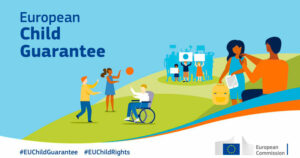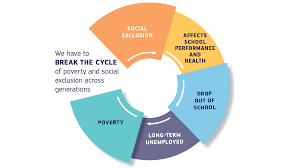The proposal pays particular attention to children with a minority racial or ethnic background (particularly Roma) as part of the ‘children in need’ target group. It also points to the European Social Fund Plus (ESF+) and the European Regional Development Fund (ERDF) as key EU funding sources to support measures addressing child poverty and social exclusion and the implementation of the European Child Guarantee.

Following many years of discussion and analysis, the European Commission has finally adopted a proposal -in the form of a Council Recommendation- to establish a European Child Guarantee aimed to prevent and combat child poverty and social exclusion and to foster equal opportunities for children in need (i.e. persons under the age of 18 at risk of poverty or social exclusion), following an integrated and multidimensional approach. It provides concrete guidance to authorities in Member States on guaranteeing the effective and non-discriminatory access for these children to a set of key services, like education, healthcare, housing and healthy nutrition, on an equal footing with their peers.
The proposal pays particular attention to children with a minority racial or ethnic background (particularly Roma) as part of the ‘children in need’ target group. It also refers to the European Social Fund Plus (ESF+) and the European Regional Development Fund (ERDF) as key EU funding sources to support measures addressing child poverty and social exclusion and the implementation of the European Child Guarantee.
The European Child Guarantee was one of the proposals included in European Commission’s President Ursula von der Leyen’s Political Guidelines for 2019-2024, following the call made by the European Parliament in 2015 to explore the feasibility of such an instrument. It should be considered within the broader policy framework set up by the EU Strategy on the Rights of the Child (in particular the second pillar), to which it contributes by focusing specifically on children in need. It is also a key deliverable of the European Pillar of Social Rights Action Plan, adopted on 4 March 2021, and answers directly to Principle 11 of the Pillar: Childcare and support to children. The Action Plan proposes a target for the EU to reduce by at least 15 million the number of people at risk of poverty or social exclusion by 2030, including at least 5 million children. The proposal for a European Child Guarantee is complementary to and consistent with a number of other EU initiatives, including the EU Roma strategic framework for equality, inclusion and participation and the EU anti-racism action plan 2020-2025.
Why is this instrument needed?
 The European Child Guarantee aims at breaking the cycle of disadvantage, poverty and social exclusion across generations that children in need face, which has profound and long-term effects, and to make sure they have access to key services and no child is left behind.
The European Child Guarantee aims at breaking the cycle of disadvantage, poverty and social exclusion across generations that children in need face, which has profound and long-term effects, and to make sure they have access to key services and no child is left behind.
In a majority of EU Member States, the rate of persons at risk of poverty or social exclusion is higher for children than for the total population (in 2019, 22.2% (nearly 18 million) of children lived in households at risk of poverty or social exclusion, as opposed to 20.9% (around 91 million) for the total population). In addition, children from disadvantaged backgrounds are disproportionally affected by social exclusion, often resulting from poverty or deprivation (for example, the poverty risk for children with a migrant or Roma background is up to three times higher than that of other children). There is also a strong correlation with their access to key services: children living in poverty or who experience particular disadvantages (including having a minority racial or ethnic background, particularly Roma) are more likely to face barriers for access to key services, and therefore inclusion and participation in the society. Finally, pre-existing inequalities have been exacerbated by the COVID-19 crisis, which entails a significant risk of an increased poverty or social exclusion rate.
Key proposals
To achieve this objective, the proposal calls on Member States to:
- Target support measures at children in need;
- When identifying children in need and within this group, take into account, wherever appropriate, specific forms of a disadvantage, such as the needs of:
– homeless children or children experiencing severe housing deprivation
– children with a disability;
– children with a migrant background;
– children with a minority racial or ethnic background (particularly Roma);
– children in alternative (especially institutional) care; and
– children in precarious family situations; - Guarantee for children in need effective and free access to:
![]() early childhood education and care (for example, avoid segregated classes)
early childhood education and care (for example, avoid segregated classes)
![]() education and school-based activities (for example, adequate equipment for distance learning and school trips)
education and school-based activities (for example, adequate equipment for distance learning and school trips)
![]() a healthy meal each school day
a healthy meal each school day
![]() healthcare (for example, facilitating access to medical examinations and health screening programmes).
healthcare (for example, facilitating access to medical examinations and health screening programmes).
These services should be free of charge and readily available to children in need.
- Guarantee for children in need effective access to:
![]() healthy nutrition (e.g. children should have healthy meals also outside school days)
healthy nutrition (e.g. children should have healthy meals also outside school days)
![]() adequate housing (e.g. homeless children and their families should have access to adequate accommodation).
adequate housing (e.g. homeless children and their families should have access to adequate accommodation).
The proposal provides guidance to Member States on how guaranteeing access to these services could be supported by corresponding measures. It also establishes governance and reporting mechanisms, including the nomination of a national Child Guarantee Coordinator, equipped with adequate resources and mandate, who will effectively coordinate and monitor the implementation of the Recommendation and act as a contact person for the Commission.
How will it be funded?
The European Social Fund Plus (ESF+) and the European Regional Development Fund (ERDF) are key EU financial instruments to support measures addressing child poverty and social exclusion and the implementation of the European Child Guarantee.
As regards ESF+, in addition to its general support to initiatives that promote social inclusion, fight poverty and invest in people, for the 2021-2027 financing period, Member States that have a rate of children at risk of poverty or social exclusion higher than the EU average (in 2017-2019) will have to earmark 5% of the fund for combatting child poverty or social exclusion, while other Member States will be required to earmark an appropriate amount. The ERDF can contribute with future-proof investments in social infrastructure, equipment and access to quality and mainstream services, as well as with cooperation projects in border regions.
Other EU funds could come from the Recovery and Resilience Facility and the Technical Support Instrument, which can support Member States in the design and implementation of their reforms aimed at addressing educational, social, economic and legal inequalities and challenges affecting children. Member States will also continue benefitting from the 2017-2023 EU milk, fruits and vegetable scheme.
Next steps
The Commission proposal for the European Child Guarantee will be discussed in the Council. The instrument proposed – a Council recommendation – offers guidance on how to implement the Guarantee, while also allowing Member States the flexibility to design and implement measures, according to their national practices.
Within six months after its adoption by the Council, Member States should prepare -together with key stakeholders- national action plans on how to implement it.
It is proposed that the Commission monitors the Recommendation’s implementation in the context of the European Semester, supported by the revised Social Scoreboard, including a new headline indicator on children at risk of poverty or social exclusion. Where the Commission sees a need for Member States to act, it will issue country-specific recommendations.
The Commission will work jointly with the Child Guarantee Coordinators and the Social Protection Committee to facilitate mutual learning (e.g. through peer reviews or peer counselling), share experiences, exchange good practice and follow up on the Member States’ actions taken to implement the Guarantee.
The Commission will regularly report to the Social Protection Committee on the implementation of the Recommendation on the basis of the biennial reports from Member States. The Commission also will work with the Committee in establishing a common monitoring framework, including quantitative and qualitative indicators, to assess the implementation of this Recommendation and in enhancing the availability, scope and relevance of pertinent data at EU level.
Finally, after an initial period of its implementation, the Commission will take stock of progress made in the implementation of the Recommendation and report to the Council by 5 years after the adoption.
Member States are also invited to build an integrated and enabling policy framework to address social exclusion of children, focusing on breaking intergenerational cycles of poverty and disadvantage and reducing the socio-economic impact of the COVID-19 pandemic.
Further information
- European Commission’s Proposal for a Council Recommendation establishing the European Child Guarantee, COM (2021) 137 final (available in all EU languages)
-
European Commission’s Staff Working Document accompanying the document ‘Proposal for a Council Recommendation establishing a European Child Guarantee’, SWD(2021) 62 final (only available in English)
- EURoma news item on European Commission’s proposal for an EU Strategy on the Rights of the Child

